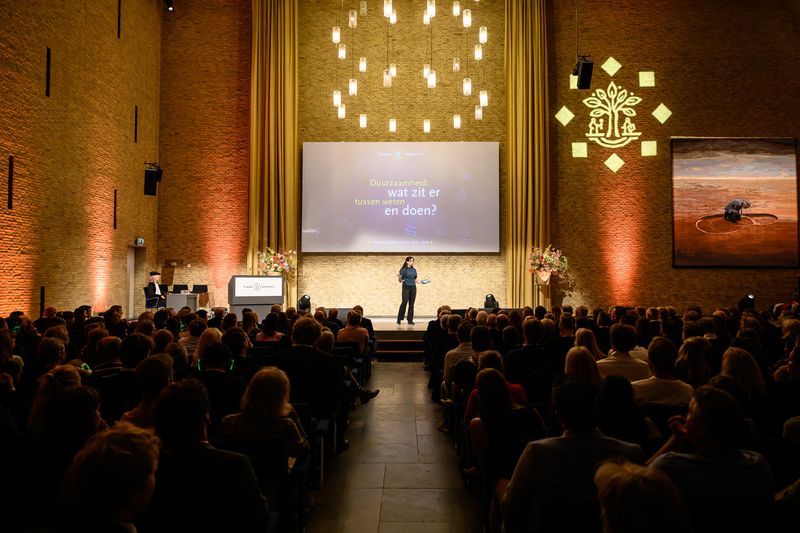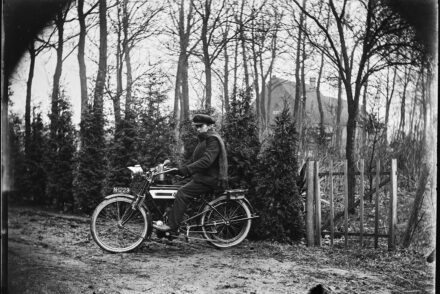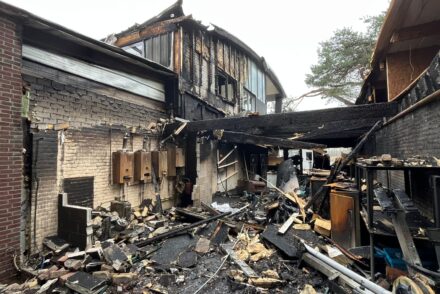Security measures Tilburg University against pro-Palestinian protesters are excessive: ‘No judge will agree to this’
Selective frisking, taking down names and numbers, and denying access to buildings. With the strict security measures during the opening of the academic year, the university is exceeding its mandate: ‘This violates fundamental rights,’ says Jan Brouwer, emeritus professor of general jurisprudence.

The start of the academic year was anything but peaceful this year. Tension was palpable at several universities. In Tilburg, too, there were fears of protests by pro-Palestine demonstrators. Consequently, the university significantly increased security.
Univers attended the opening, witnessed the strict measures taken, and created a reconstruction of the day. The editors spoke with several staff and students who expressed their dissatisfaction with the proceedings.
Several notable incidents were submitted to Jan Brouwer, emeritus professor of general jurisprudence at the University of Groningen, and to human rights lawyer Jelle Klaas, asking: did the university act appropriately or did it overstep the mark?
Cancelled protest
The day began with disappointment for Palestine Solidarity Tilburg (PST) protesters. They planned to demonstrate at the opening of the Green Office, but because the opening was moved forward an hour at the last minute, they called off the protest. The protesters slunk off to various campus buildings, either to attend their lectures, find a study spot, or go to the office.
Once they arrived at the Dante Building, several students wearing kufiya scarves were denied entry. Only students with lectures were allowed to enter the building after consultation. Their names and student numbers were recorded. Some were frisked, and in one case, a student was even assigned a security guard, who kept a close eye on the student. Staff members wearing kufiya scarves described similar experiences. Students and staff without scarves (or ties to PST) were able to proceed without any problems.
Opening of the academic year
Later that day, attention shifted to the Koopmans Building and the auditorium of the Cobbenhagen Building, where the official opening of the academic year took place. Students who had previously attended PST demonstrations or were wearing a kufiya scarf were again denied access to the building.
Staff member Michiel Bot and student Bas – both active in PST – managed to reach the auditorium entrance. Both had QR access codes because they had registered for the event. Student Bas was escorted out of the auditorium after a few minutes. The officers pointed out his kufiya scarf and his ties to PST. Univers witnessed him, surrounded by three security guards, being the only one present to be frisked. Security officers deemed his presence ’too disruptive.’ They also confiscated the flyers from his inside jacket pocket.
Michiel Bot was also approached by three security guards in the auditorium. They ordered him to leave three times, which Bot ‘experienced as intimidating.’ When Bot asked for a reason, he didn’t. Other TiU employees, not affiliated with PST, confirmed the incident to Univers and also described the security team’s approach as intimidating.
In violation of fundamental rights
The university appears to be overstepping its bounds with its strict security measures during the opening of the academic year, according to Jan Brouwer, professor of general jurisprudence at the University of Groningen.
‘Writing down the names and student numbers of students wearing a kufiya scarf? Or denying them access because they have ties to a protest group? That’s like giving individuals a cold shower and discouraging them from expressing their political views. This violates the General Equal Treatment Act. Moreover, by frisking, the university is significantly infringing on constitutionally protected privacy rights. No judge will agree to that.’
Brouwer emphasizes that the university is an independent legal entity and is not subject to the Public Demonstrations Act (WOM). ‘It owns its buildings and grounds and has private-law obligations. Based on this, the university can, within reasonable limits, determine how it handles demonstrations on its grounds, but it does have a duty to facilitate freedom of demonstration.’ The opening of the academic year is not a public event, so the university can impose conditions regarding access and behavior.
But according to Brouwer, these conditions must be the same for everyone: ‘You cannot arbitrarily deny people access or selectively search them because they are wearing a scarf or belonging to a protest group. That violates fundamental rights. If a search is conducted, it must be voluntary. At festivals, this is stated in the general conditions of access, and those measures apply to everyone.’
‘Unacceptable measures‘
According to Brouwer, the measures taken by the university go far too far: ‘Excluding and frisking based on the suspicion that an employee or student could disrupt the meeting, solely because of their clothing or political views, is unlawful and completely unacceptable.’
Whether the student consented to the frisking is irrelevant, according to Brouwer. ‘The overwhelming force of multiple security guards when removing students from the auditorium is so great that a student feels compelled to cooperate. Any semblance of voluntariness disappears under the pressure and intimidation of the situation.’
Human rights lawyer Jelle Klaas also emphasizes that the rights of the students and staff have been violated: ‘The right to demonstrate and freedom of expression also apply at the university. Wearing clothing that reflects this – but is also a cultural expression – is part of that. Students should not be denied access to buildings, followed, or checked simply or based on their opinions.’
Response from Tilburg University: ‘Students and staff experienced intimidation. We apologize for this’
Tilburg University stands for an open and safe academic community where everyone feels welcome. Unfortunately, things went wrong on the day of the opening of the academic year that should not have happened. Students and staff experienced intimidation. We apologize for this.
Tilburg University considers the right to demonstrate very important. We permitted demonstrations as much as possible or consulted with the demonstrators about how a protest could take place safely. We still support these principles. Unfortunately, the events on September 1st gave a different impression. We deeply regret this.
At the same time, we also want to provide context. Following the occupation of the Dante Building during Night University, we are extra vigilant for potential disruptions. This occupation caused feelings of fear and insecurity among many on campus. It is our responsibility to ensure that primary processes continue as safely as possible. Therefore, enhanced security measures were in place on the day of the Opening of the Academic Year, including a guarded cloakroom and additional security staff. An agreement was reached with Palestine Solidarity Tilburg (PST) that a silent protest outside would be possible, but for the safety of all attendees, this was not permitted inside the Cobbenhagen Building, where the official opening took place.
We deeply regret that students and staff felt unwelcome because of their keffiyeh or involvement with PST. Our commitment has never been to exclude people based on their clothing or beliefs. Students identified as having participated in previous PST demonstrations were asked, partly due to heightened vigilance, if they had an access code, or it was checked whether they needed to be in the Cobbenhagen Building for a lecture.
We acknowledge that the implementation of the security measures was not always appropriate and that this led to unwarranted and painful situations. We understand that security acted in a context where they had to make decisions under pressure in a short period of time. We will thoroughly evaluate this and learn from it, so that we can ensure safety in the future without members of our community feeling excluded.
Bas is a fictitious name, the real name is known to the editors.







